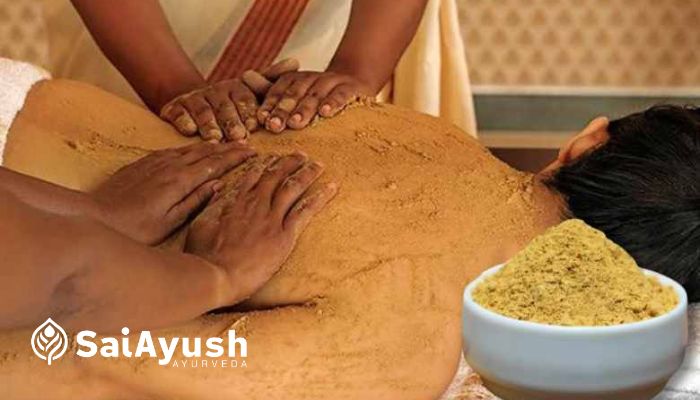Obesity is defined as an excessive build-up of body fat that is harmful to health and is a growing global health concern. Obesity is called “Sthoulya” in Ayurveda and is viewed as a Kapha dosha disorder. Obesity is a long-term health situation marked by storing too much fat in the body. It can cause many health issues, including diabetes, high blood pressure, and heart disease. The Body Mass Index (BMI) is usually used to measure it. Poor eating habits and insufficient exercise often lead to overweight individuals with a BMI of 30 or higher.
The Ayurvedic Perspective on Obesity
Ayurveda, the ancient Indian system of medicine, views obesity as a result of imbalances in the body’s doshas—Vata, Pitta, and Kapha. In the case of obesity, an excess of Kapha dosha is primarily responsible. This imbalance can be attributed to various factors including poor dietary habits, sedentary lifestyle, genetic predisposition, and psychological factors such as stress and anxiety.
Key Factors Contributing to Obesity in Ayurveda
- Dietary Habits: Overconsumption of heavy, oily, and sweet foods increases Kapha dosha, leading to weight gain.
- Lack of Physical Activity: A sedentary lifestyle exacerbates the accumulation of Kapha, promoting fat storage.
- Emotional Factors: Stress, depression, and emotional eating contribute to weight gain and disrupt the balance of doshas.
- Metabolic Rate: Slow metabolism, influenced by a Kapha imbalance, can result in the inefficient burning of calories.
Ayurvedic Treatments for Obesity
Ayurveda offers a comprehensive approach to managing obesity through natural and holistic methods. Here are some effective treatments:

ayurvedic obesity treatment
- Dietary Modifications (Aahar)
- Kapha-Pacifying Diet: Incorporate foods that are light, dry, and warming. Emphasize bitter, astringent, and pungent tastes to balance Kapha. Include green leafy vegetables, legumes, whole grains, and spices like ginger, turmeric, and black pepper.
- Avoid Kapha-Aggravating Foods: Reduce intake of heavy, oily, and sweet foods such as dairy products, fried foods, and sweets. Limit salt and cold foods and beverages.
- Herbal Remedies (Aushadhi)
- Triphala: A blend of three fruits—Amla, Haritaki, and Bibhitaki—Triphala aids digestion, detoxifies the body, and promotes weight loss.
- Punarnava (Boerhavia Diffusa): This herb has diuretic properties and helps reduce water retention and swelling, contributing to weight loss.
- Lifestyle Changes (Vihar)
- Regular Exercise: Incorporate activities like brisk walking, yoga, and other forms of physical exercise to stimulate metabolism and reduce Kapha.
- Pranayama (Breathing Exercises): Practices like Kapalbhati and Bhastrika help in boosting metabolism and reducing stress, aiding in weight management.
- Detoxification (Panchakarma)
- Virechana (Purgation Therapy): Helps eliminate toxins from the body and balance the doshas, particularly effective for Pitta and Kapha disorders.
- Udvartana (Herbal Powder Massage): A special therapeutic deep tissue massage using herbal powders that reduces cellulite, improves circulation, and promotes fat metabolism.
- Mind-Body Practices
- Meditation and Stress Management: Techniques like mindfulness meditation, yoga, and adequate sleep are crucial for managing stress and preventing emotional eating.
- Daily Routine (Dinacharya): Following a consistent daily routine helps in maintaining balance in the body and mind, preventing obesity.
Unique Ayurvedic Insights on Obesity
- Agni’s (Digestive Fire) role: Agni, or the digestive fire, is important for healthy metabolism according to Ayurveda. Fat and poisons (Ama) build up in the body due to weak Agni. It is essential to strengthen Agni with dietary modifications and herbal supplements.
- Personalized Treatment: Unlike a one-size-fits-all approach, Ayurveda provides personalized treatment plans based on an individual’s Prakriti (constitution) and Vikriti (current state of imbalance).
- Seasonal Regimens: To maintain dosha balance and avoid weight gain, Ayurveda prescribes particular dietary and lifestyle practices for each season.
Ayurveda focuses on the root cause of the problem and treats the condition effectively. Obesity is mainly caused by the imbalance of the kapha dosha, and with the help of internal and external therapies, it can be brought back to normal. That’s how obesity is reduced. With a proper lifestyle and diet, you can lead a happy and healthy life.
FAQ
Q:Which Ayurvedic treatment is best for weight loss?
A:Panchakarma is the most effective Ayurvedic treatment for weight loss. It detoxifies the body and boosts metabolism, hence promoting weight loss.
Q: What is the cause of obesity, according to Ayurveda?
A: The primary cause of obesity, according to Ayurveda, is an imbalance in the Kapha dosha, which is frequently brought on by an unhealthy diet, inactivity, and lifestyle choices.
Q: What is the relationship between food and obesity?
A: Food and obesity are related in that consuming processed, high-calorie, and unhealthy foods can result in obesity and weight gain.
Q: If I follow a strict diet plan and exercise, my weight is reduced, but when I stop it, my weight gains more and more. So why is this happening?
A:The body adjusts to strict diet and exercise, slowing down metabolism and potentially leading to rapid weight gain when stopped.
Q: I always walk 30 minutes after dinner, but my weight is never reduced. Why?
A: Walking 30 minutes after dinner is effective, but it may not be enough to lose weight; a balanced diet and increased exercise may be necessary for results.
Q: How does obesity management therapy work?
A: Ayurvedic weight management therapy combines diet, exercise, lifestyle modifications, and occasionally drugs or treatments to help you lose weight and keep it off.
Q: Can I have an Obesity Management program therapy more than once?
A: Of course, it is possible to undergo an Obesity Management programme therapy multiple times in order to either maintain or further reduce one’s weight.
Discover the healing power of Ayurveda with our latest article at Sai Ayush Ayurveda Hospitals! Dive into the age-old wisdom that can rejuvenate your body and mind. Click here to read more:



